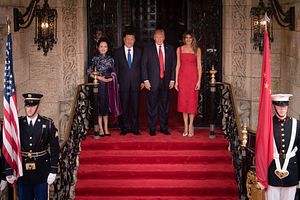Although U.S President Donald Trump’s chief political strategist Stephen K. Bannon left his post last week, his main policy goal of taking a harder line with China on trade seems to haunt the White House.
On August 18 — the same day Bannon was fired — U.S. Trade Representative (USTR) Robert Lighthizer officially initiated an investigation of China’s intellectual property practices under Section 301 of the Trade Act of 1974. On August 21, China once again issued a strong statement, signaling China would fire back.
According to the USTR’s statement, the investigation will focus on China’s policies on technology transfer, intellectual property, and innovation; if USTR finds such practices are unreasonable or discriminatory and burden or restrict U.S. commerce, it has the authority to take all appropriate and feasible action, under Section 301.
Lighthizer claimed that he had made this move “after consulting with stakeholders and other government agencies.”
In response, China’s Ministry of Commerce (MOC) on August 21 expressed “strong dissatisfaction” toward USTR’s decision, claiming that the U.S. side, ignoring WTO rules, is irresponsible in initiating trade investigations according to domestic law.
MOC criticized USTR for “sending a wrong signal” just after China and the U.S. had made progress and reached a series of outcomes under the framework of the U.S. – China Comprehensive Economic Dialogue.
What MOC referred to here is the 100-day action plan initiated after the U.S. President Donald Trump and Chinese President Xi Jinping’s Mar-a-Lago meeting. Based on the plan, China apparently compromised on several key issues, showing ’s strong will to maintain a relatively stable trade relationship with the U.S. For example, China agreed to allow imports of U.S. beef; China permitted wholly foreign-owned financial services firms in China to provide credit rating services, and to begin the licensing process for credit investigation; and China issued both bond underwriting and settlement licenses to two qualified U.S. financial institutions. China’s compromises had been seen as the White House’s success when the plan was first made public.
By intentionally mentioning the plan again now, MOC seems to be warning the White House about China’s potential retaliation. In fact, MOC stated China’s position clearly:
China will pay close attention to the investigation and will take all appropriate measures to resolutely safeguard the legitimate rights and interests of the Chinese side.
This is actually the second time that China has vowed to “resolutely defend its interests.” As the Brookings Institution noted, “historically, China has always responded to trade measures with proportionate retaliation.”

































